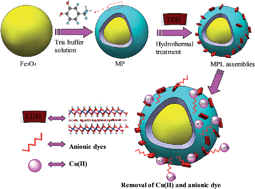Retracted Article: Magnetic polydopamine decorated with Mg–Al LDH nanoflakes as a novel bio-based adsorbent for simultaneous removal of potentially toxic metals and anionic dyes†
Abstract
Potentially toxic metals and dyes commonly coexist in industrial wastewaters, posing a serious threat to public health and the environment and making the treatment more challenging. Herein, we report a novel magnetic polydopamine (PDA)–LDH (MPL) bifunctional material, which is fabricated by an easy and green approach for the simultaneous removal of potentially toxic metals and anionic dyes. In this assembly, both PDA and LDHs are expected to capture these pollutants. In a mono-component system, the removal behaviors showed heterogeneous removal capacities of 75.01, 624.89 and 584.56 mg g−1 for Cu(II), methyl orange (MO) and Congo red (CR), respectively. Interestingly, the presence of CR and MO enhanced the removal of Cu(II) significantly in the Cu(II)–dye binary system. However, the presence of Cu(II) had no significant effect on dyes. Based on the characterization results including X-ray diffraction (XRD) analysis, Fourier transformed infrared (FT-IR) spectroscopy, X-ray photoelectron spectroscopy (XPS) and elemental mapping, the removal of Cu(II) was mainly controlled by bonding with surface functional groups (hydroxyl, catechol, imine and amine groups), coupled with isomorphic substitution and surface precipitation. In summary, such a green and facile synthesis method, efficient removal performance and superior reusability suggest that the MPL assemblies have practical application potential for integrative and efficient treatment of coexisting toxic pollutants.


 Please wait while we load your content...
Please wait while we load your content...